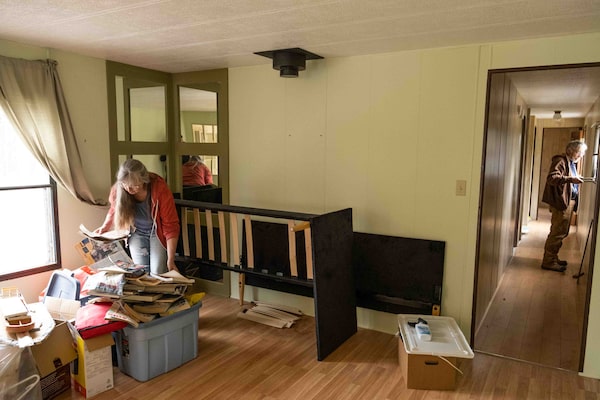Kevin Cameron, whose father died last year and whose mother is in a nursing home, must now decide what to keep or toss from their cluttered home in Shelburne, N.S.Aaron McKenzie Fraser/The Globe and Mail
Ideally, your parents will begin culling long before fate puts the job in the hands of their descendants. (So if mom asks, count your blessings and be clear about what you want – and, more importantly, what you don’t want.) But if you are now facing a house jam-packed with parental treasure and trash, here’s some advice, courtesy of home organizers, junk removal experts and kids who have been there.
Divide the work into steps
Get rid of anything that can attract bugs and mice. Take it one room at a time. Brenda Thompson, who is still cleaning out her parents’ home in Nova Scotia, suggests starting with the superficial items, such as appliances, before wrestling with more sentimental pieces. If you live far away or the house is just too full, home organizers and junk removal companies (which typically charge by the truckload) can assist with sorting, moving, recycling and consignment sales.
Lift the rug, check the vents, search the pockets
“People lose track of items,” says Gareth Roberts, the owner of a Toronto Just Junk franchise. “Check the nooks and crannies.” He advises looking carefully through books, boxes and clothing. He’s had customers find jewellery in air vents and gold coins that had been pressed into the underpad of a carpet.
Savour the memories
Take a selfie with the ugly art your parents bought before you were born. Find a way to laugh at how many plastic grocery bags Dad could squeeze into an old Kleenex box. Is it a hassle that your mom saved every report card, piece of art work and school project back to Grade 1? Maybe, but it’s also love.
Don’t get sentimental about the piano
It’s often impossible to find a good home for that well-loved, full-size piano passed down through the family. Many of them end up in pieces at the landfill. Deb Derbyshire, co-owner of a Just Junk Calgary, says her staff usually avoid destroying the piano in front of the customer. “It’s one thing to know where it is going at the end of the day, and another to see it being smashed to smithereens.” Meanwhile, secondhand stores are becoming more discriminating about what they have room to store and it might take 10 phone calls to find a charity that wants secondhand books. Even if an item is worth “this much” on the internet, you still have to find someone willing to buy it.
Save it, without saving it
Take pictures of items you can’t save. Digitize the photo albums. If the china has to go, save one special piece.
A photo of Brenda's Thompson's late father, Rick, and three pairs of his glasses that she's chosen to keep. She donated five other pairs.Andrew Tolson/The Globe and Mail
Be kind to yourself
You’re packing up memories. Revisiting your complicated relationships with your parents. Trying to keep peace with your siblings. And you’re grieving. Some visits will be easier than others. Practise self-compassion and kindness. Rachel Berman, a professor at Toronto Metropolitan University, remembers showing up one day to clean out her parents’ home: “It was just too painful; I turned and left.”
Give cherished items to grateful strangers - and revel in their joy
Laura Gilbert, the author of The Stories We Leave Behind, remembers putting her parents knickknacks on a free neighborhood website, where they became treasures to other people. “Giving those things away brought me so much happiness,” she says.
Beware the lure of the storage locker
Despite her best intentions, Dr. Berman has rented space for furniture, boxes of photographs, the record collection. “Emotionally, you are paying for this because you couldn’t make the decision to let it go at the moment.” Take the time you need, but don’t forget the stuff is there.
Clean up your own mess
After emptying out a parent’s home, people often make the same vow: to downsize early, plan deliberately, make it easier for their kids. Every January, Ms. Gilbert says she updates a three-page document with her financial information that includes a list of possessions that shouldn’t just go into a dumpster. “If I get hit by a meteor today, it’s a place for my kids to start.”

Ms. Thompson clears out her parents' old home.Andrew Tolson/The Globe and Mail
Our Morning Update and Evening Update newsletters are written by Globe editors, giving you a concise summary of the day’s most important headlines. Sign up today.